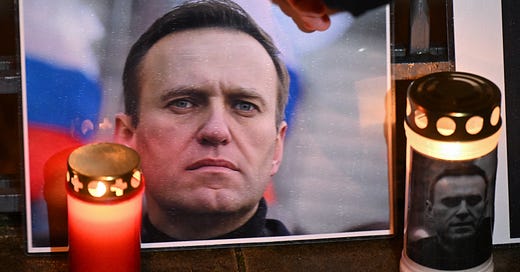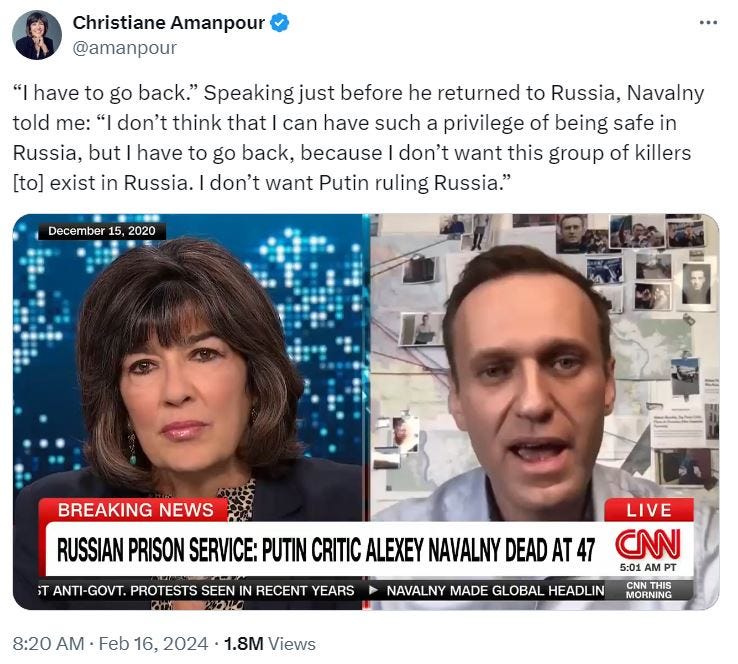Be Like Navalny
May his courage be an inspiration for defenders of the rule of law everywhere.

WE CAN ALL BE ALEXEI NAVALNY.
Courage resides within each of us, even if we are never called upon to show it in the way that the martyred Russian opposition leader did. On Saturday, Navalny’s team confirmed that he had died the day before at the age of just 47 in the Siberian prison camp where Vladimir Putin, the Russian dictator, held him, often in solitary confinement.
Navalny’s blood is on Putin’s hands. It matters not whether he had Navalny murdered Friday or simply drained the life from him through month after month of blanketless cold isolation cell floors, rotting morsels of food, and physical brutality.
Amazingly, in January 2021, Navalny had returned voluntarily to Moscow from Germany. Five months earlier, operatives of the Russian security service had poisoned him with an especially potent form of the nerve agent Novichok. Only by the skill of German doctors, who put him in an induced coma, did Navalny survive the attack. Yet despite the assassination attempt, and despite knowing that his life would be in danger if he returned to Russia, duty called him to do so.
“I have to go back, because I don’t want this group of killers [to] exist in Russia,” he said. “I don’t want Putin ruling Russia.”
“There is bravery,” wrote Jeremy Cliffe in the New Statesman, “and then there is Alexei Navalny’s return to Russia.”
How can we help but be inspired by that kind of dedication to Russian liberty?1 “I don’t want to give up either my country or my beliefs,” Navalny wrote in a Facebook post last month, three years after his return. “If your beliefs are worth something, you must be willing to stand up for them. And if necessary, make some sacrifices.”
Navalny surely wrote that last sentence knowing that his willingness to give up everything could not be asked of others—and knowing that small sacrifices and small actions matter, too. Coming in numbers, they add up.
We all have the ability to speak out against corruption and injustice, even if none of us could use our voices as powerfully as Navalny used his.
We all have the capacity to keep faith, even if not at the level sustained by Navalny. His was an unwavering belief in the Russian people’s ability to rise up against an autocrat who seeks to intimidate all opponents by jailing and killing the most visible, often by having them tossed out of windows.
Navalny’s faith was incomparable. Knowing the fate that awaited him, he said, in the Oscar-winning 2022 documentary Navalny, “If they decide to kill me, it means we are incredibly strong.” He added, “You are not allowed to give up”:
While no one can be expected to match that, we can honor his memory by keeping our belief, especially on bad news days, that democracy, freedom, and the rule of law will prevail.
WE CAN ALL BE NAVALNY in ways that are even harder to face up to. We, too, are vulnerable to the collapse of the rule of law. Killing Navalny was possible because first, Putin killed it.
There are plenty of laws in Russia, but Putin has put himself above every one.
You might be shocked to learn that the Russian constitution guarantees “the freedom of ideas and speech.” It promises that “the freedom of mass communication shall be guaranteed” and “censorship shall be banned.”
That’s empty verbiage under Putin’s rule. With dictators, promises on parchment are protection for no one.
Putin did not build his gulag in a day or drain law of meaning overnight. And in the United States, his admirer Donald Trump did not succeed in ending America’s rule of law during his four years in office—but not for lack of trying. He made serious and damaging inroads then, and he hasn’t stopped since.
Remember Trump taking in money from foreign heads of state via the Trump International Hotel in violation of the Emoluments Clause?
Remember illegally diverting Defense Department funds to build a few miles of “wall,” and abusing power by repeatedly appointing “acting” cabinet officials to avoid Senate advice and consent?
Remember how Trump tolerated violations of the Hatch Act by members of his White House team who did politics on government time? How, when he was in office, he said Article II of the Constitution gives him “the right to do whatever I want as president?” How in 2022, he said that he should be brought back to office even if it means “termination” of the Constitution? How he now openly talks about wanting to be a dictator?
Oh, and those little things about fomenting an insurrection to stay in power, and having the right to take top secret national security documents after his time in office?
Today we have Trump nakedly claiming in the Supreme Court that he is immune from prosecution for crimes committed while in office, whether in the past or if re-elected. That would include, as his lawyer told the D.C. Court of Appeals in January, having Navy Seal Team Six assassinate his political opponents.
And Trump has explicitly spoken about wanting to use the power of the state to persecute his political enemies. That’s how it goes with dictators and wannabe dictators. Timothy Snyder, the Yale scholar of twentieth-century totalitarianism, put it succinctly:
Eliminating opponents is what autocrats do because they know that their hold on power cannot survive true competition, which is what the rule of law is meant to allow. So they must erase rivals and critics by imprisoning them without due process, and ultimately by killing them.
AS PROFESSOR SNYDER and five other experts “on democracy, violence and the rule of law” wrote last month in an amicus brief to the Supreme Court in the case to disqualify Trump from Colorado’s presidential ballot:
In countries such as Venezuela, Hungary, and Nicaragua, leaders willing to circumvent democracy who are forced from power and return were much more dangerous the second time. [Emphasis added.]
Referring to Trump’s GOP, Jonathan V. Last remarked on Friday that “in a rational society, the party of Putin would be getting blown out at the ballot box, every single time. And yet we live in a world where every election is a coin-flip.”
It’s up to us to stop Trump regaining the power to make himself Putin. To do that, none of us need come close to matching Navalny’s willingness to give what Lincoln called “the last full measure of devotion.” We simply have to do what the martyred Russian opposition leader asked—play whatever small part we can in preserving our own freedom.
That is the way we can all be Alexei Navalny.
It is worth remembering that Navalny was far from alone as a person of courage in Putin’s Russia. We only know the few to whom the press has paid attention—including Wall Street Journal reporter Evan Gershkovich, who was arrested and jailed on March 29, 2023. Three of Navalny’s lawyers are also imprisoned, as are Ilya Yashin and Vladimir Kara-Murza, Navalny’s comrades in dissent.







